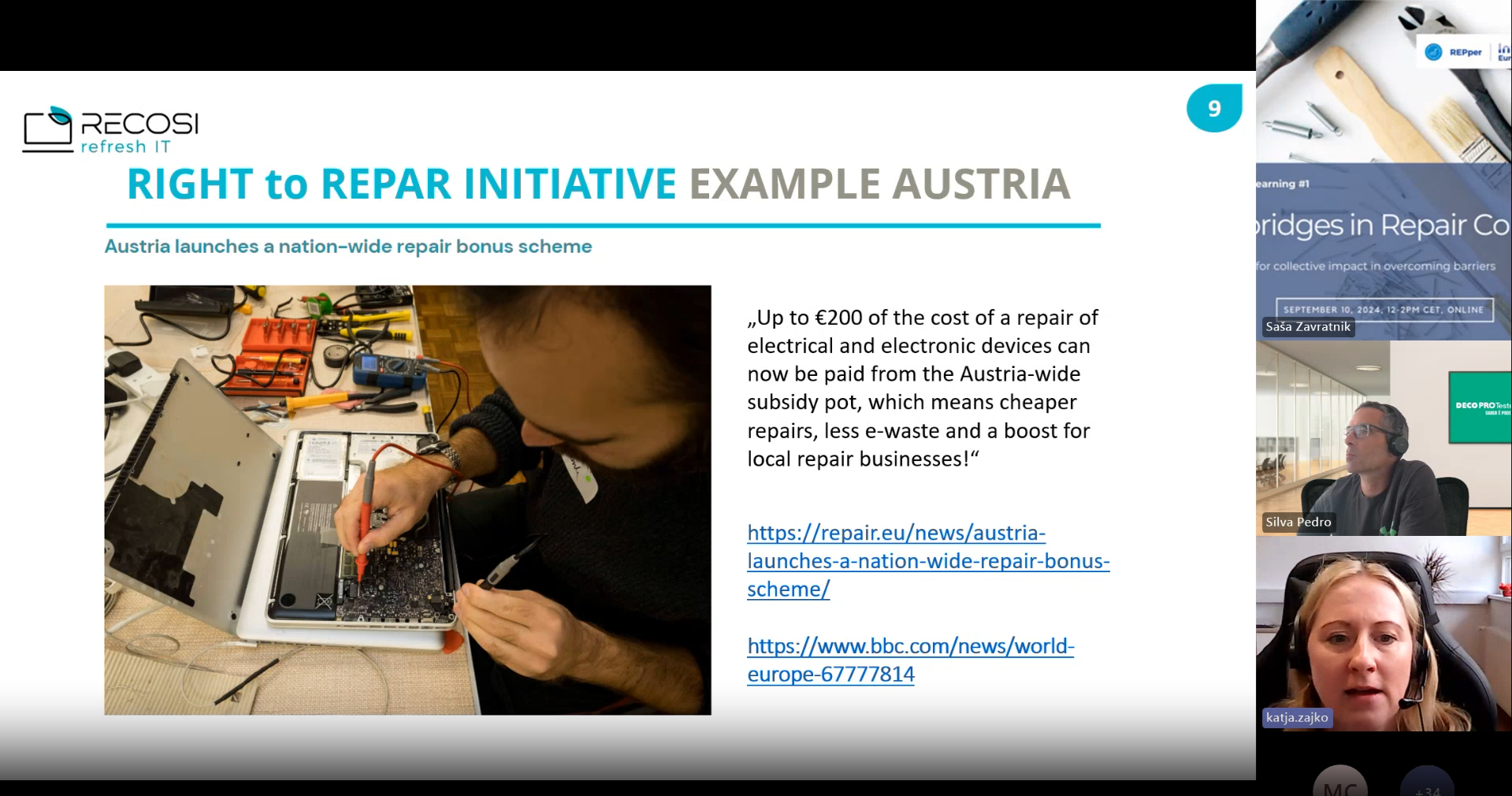On September 10, REPper Slovenian partner E-Zavod held a peer-learning session featuring speakers from Slovenia, Greece and Bosnia-Hercegovina who presented on waste treatment trends, strategic communications, creative design, and scientific research. Here are a few learnings:
- Implementation of EU Directive and digital passport (Katja Zajko, Slovenia)
Dr. Katja Zajko, founder and director of Recosi, (www.recositech.com) discussed the challenges faced by the refurbishment and repair industry, emphasizing the massive amount of electronic waste and the insufficient recycling efforts. She highlighted the obstacles in the industry, such as the scarcity of spare parts and the necessity for excellent technical skills for repairing electronic devices, stressing the importance of careful and skilled handling. Legal costs, extended producer responsibility fees, and the unregulated grey market reuse organizations face are also challenging.
Recosi specializes in the professional refurbishment and resale of high-quality refurbished IT equipment, including laptops, computers, workstations, and monitors. It sources equipment exclusively from the business line, from multinationals abroad, and offers it back to the market at less than half the original price. Recosi proudly holds ISO 9001, ISO 14001, and ISO 45001 certifications and is present in the Slovenian, Croatian, and German markets.
- The repair perspective in the utility sector (MajaRozman, Slovenia)
Maja Rozman, from the Chamber of Public Utilities of Slovenia (ZKGS), presented the voluntary cooperation with corporations in Slovenia and their collaboration with consumer organizations, especially at roundtables and conferences, where they share news, etc. She suggested the need for an official repair training programme. The Chamber informs its members where to get information on training. They are in the Chamber of Commerce and Industry of Slovenia consortium to train plumbers, where Slovenia also faces a shortage of skilled staff. A similar consortium could be set up for repair services, using plumbing services as a model for integrating repairs into schools.
The Chamber of Public Utilities of Slovenia (ZKGS) is an independent, voluntary, non-profit association of legal and natural persons engaged in economic activity in the field of the communal economy.
- Challenges in repair economy – textile (Michail Karypidis, Greece)
Dr Karypidis is an assistant professor at the Department of Creative Design and Clothing of International Hellenic University. He emphasized the importance of integrating repair and remanufacturing into the broader framework of the circular economy, which aims to minimize waste and extend product lifecycles. His presentation outlined the foundational 3R model (Reduce, Reuse, Recycle) and the expanded 6R model (adding Recover, Redesign, and Remanufacture) to highlight strategies for sustainability.
He suggests suitable solutions for education, redesigning products for easier disassembly and recycling, investing in new technologies, and promoting sustainable fashion practices. On the other hand, through innovation and creativity, such as AI technology and 3D printing, designers can circumvent repair issues and work towards more sustainable practices.
- Repair economy: policy issues (Amila Pilav-Velić, Bosnia and Hercegovina)
Prof. Dr Amila Pilav-Velić is the Vice Dean for Scientific Research and Projects at the University of Sarajevo, School for Economics and Business. She focused on the circular economy and its challenges in the context of emerging economies, specifically in Bosnia and Herzegovina (BiH), highlighting that the policy process is typically limited to the design phase, focusing little on implementation, monitoring, or evaluation.
Bosnia and Hercegovina faces many challenges: weak institutions and a fragmented governmental system, lack of collaboration between industry, government, and research institutions, and limited national funding. The current policy framework does not address the actual needs of companies in terms of circularity. Possible solutions to overcome obstacles in the repair economy are the implementation of more structured and evidence-based policies based on reliable data and actual needs, better (international) cooperation among actors, development of programmes to use available resources better and reduce competition between actors in the ecosystem, and introduction of monitoring and evaluation processes to adapt policies.


